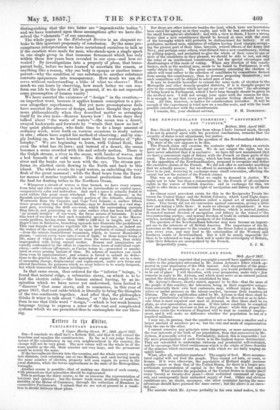THE NEWFOUNDLAND FISHERIES : " ADJUSTMENT " NOT "JUSTICE."
Belfast, 25th April 1857.
Bin—David Urquhart, a writer from whom I have learned much, though I do not in general agree with his practical conclusions, remarks that the security of states is not adjustment, but justice. This saying is appropriate to the question of the Newfoundland fisheries. The state of the case appears to be this.
The French claim and exercise the exclusive right of fishery on certain parts of the Newfoundland coast. We do not contest the right, but we have never admitted that it is exclusive : we have till now maintained that we have a concurrent right of fishery with the French on those parts of the coast. The recently-drafted treaty, which has been defeated, as it appears, by the opposition of the Newfoundlanders, proposed to recognize and define the exclusive claims of the French. We did not offer to surrender anything that we actually possess' but we offered to surrender a claim which we believe to be just, receiving in exchange some small concession, affecting the extent but not the nature of the French claims.
This was an adjustment. What we ought to demand is justice. We ought not to take less than a renunciation by the French of all exclusive rights in the waters of British America : and in exchange for this, we ought to offer them a concurrent right of navigation and fishery in ell those waters.
An almost exact precedent exists for this in the Reciprocity Treaty between the United States and the British Colonies, which Lord Elgin negotiated, and which William Chambers called a signal act of national good sense. This treaty did not set concession against concession, giving a little here and taking a little there : it made no attempt at adjustment : it was based on the broad principle of mutual freedom, which is mutual justice. It enacted mutual freedom of navigation and fishery. in the waters of the two contracting parties ,• and mutual freedom of trade in certain enumerated articles, including all the chief products of the Colonies. The question of the Newfoundland fisheries may soon become an important one to the interests of all British America. The importance of the St. Lawrence as the entrance to the country on the Great Lakes is more clearly seen every year, and may lead to the colonization of the Western and Southern coasts of Newfoundland. But it will be nearly impossible for these to be colonized so long as their soil is under the sovereignty of Britain, while their fisheries are monopolized by the French. Respectfully yours, 7. J. 3f,


































 Previous page
Previous page